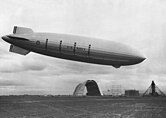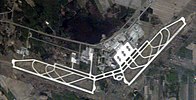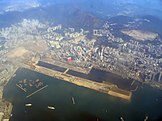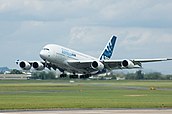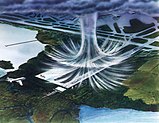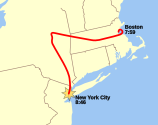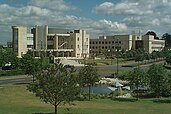Portal:Aviation/Selected article
Instructions
- Add a new Selected article to the next available subpage. Use {{Selected article}}
- Update
|max=to new total for its {{Random portal component}} on the main page.
Selected article 1
Portal:Aviation/Selected article/1
Ryanair is an airline based in Ireland. It is Europe's largest low-cost carrier, operating 209 low-fare routes to 94 destinations across 17 European countries. Over the years it has evolved into the world's most profitable airline, running at remarkable margins by relentlessly driving costs down. Ryanair has been characterised by rapid and continuing expansion, enabled by the deregulation of the air industry in Europe in 1997. It operates a fleet of 74 Boeing 737s, and currently has firm orders for an additional 225 Boeing 737-800 airplanes by 2010, with options on a further 193. Ryanair is one of Europe's most controversial companies, praised and criticised in equal measure. Its supporters praise its commitment to exceptionally low fares, its radical management, its populism, and its willingness to challenge what Ryanair calls the 'establishment' within the airline industry. Critics, meanwhile, have attacked its labor union policies, and have charged that it practises deceptive advertising. (Full article...)Selected article 2
Portal:Aviation/Selected article/2
An airport is a facility where aircraft can take off and land. At the very minimum, an airport consists of one runway (or helipad), but other common components are hangars and terminal buildings. Apart from these, an airport may have a variety of facilities and infrastructure, including fixed base operator services, air traffic control, passenger facilities such as restaurants and lounges, and emergency services. (Full article...)Selected article 3
Portal:Aviation/Selected article/3
The Civil Air Patrol is the official civilian auxiliary of the United States Air Force. It was created just days before the Attack on Pearl Harbor in 1941, and is credited with sinking at least two German U-boats during the War. It was seen as a way to use America's civil aviation resources to aid the war effort, rather than grounding them, as was the case in the United Kingdom. Today, the Civil Air Patrol is a volunteer organization dedicated to education and national service, including people from all backgrounds and all walks of life. It performs three key missions: Emergency services (including search and rescue), aerospace education for youth and the general public, and cadet programs. The September 11, 2001 attacks demonstrated the importance of the Civil Air Patrol, as it was this organization's aircraft that flew blood to victims of the attack as well as providing the first aerial pictures of the World Trade Center site. (Full article...)Selected article 4
Portal:Aviation/Selected article/4
Pan American World Airways, most commonly known as "Pan Am", was the principal international airline of the United States from the 1930s until its collapse in 1991. Originally founded as a seaplane service out of Key West, Florida, the airline became a major company; it was credited with many innovations that shaped the international airline industry, including the widespread use of jet aircraft, jumbo jets, and computerized reservation systems. Identified by its blue globe logo and the use of "Clipper" in aircraft names and call signs, the airline was a cultural icon of the 20th century, and the unofficial flag carrier of the United States. Pan Am went through two incarnations after 1991. The second Pan Am operated from 1996 to 1998 with a focus on low-cost, long-distance flights between the U.S. and the Caribbean. The current incarnation, based in Portsmouth, New Hampshire and known as the Pan Am "Clipper Connection", is operated by Boston-Maine Airways. The airline currently flies to destinations in the northeastern United States, Florida, Dominican Republic, and Puerto Rico. (Full article...)Selected article 5
Portal:Aviation/Selected article/5
A Zeppelin is a type of rigid airship pioneered by Count Ferdinand von Zeppelin in the early 20th century. Due to the outstanding success of the Zeppelin design, the term zeppelin in casual use came to refer to all rigid airships. The German defeat in World War I halted the business temporarily, but under the guidance of Hugo Eckener, the successor of the deceased count, civilian Zeppelins experienced a renaissance in the 1920s. They reached their zenith in the 1930s, when the airships LZ127 "Graf Zeppelin" and LZ129 "Hindenburg" profitably operated regular transatlantic passenger flights. The Hindenburg disaster in 1937 triggered the fall of the "giants of the air", though other factors, including political issues, contributed to the demise. (Full article...)Selected article 6
Portal:Aviation/Selected article/6
The CFM International CFM56 series is a family of high-bypass turbofan aircraft engines made by CFM International with a thrust range of 18,500 to 34,000 pound-force (lbf) (80 to 150 kilonewtons (kN)). CFMI is a 50–50 joint-owned company of SNECMA and GE Aviation. Both companies are responsible for producing components and each has its own final assembly line. The CFM56 first ran in 1974 and, despite initial political problems, is now one of the most prolific jet engine types in the world: more than 20,000 have been built in four major variants. It is most widely used on the Boeing 737 airliner and under military designation F108 replaced the Pratt & Whitney JT3D engines on many KC-135 Stratotankers in the 1980s, creating the KC-135R variant of this aircraft. It is also one of two engines used to power the Airbus A340, the other being the Rolls-Royce Trent. The engine is also fitted to Airbus A320 series aircraft. Several fan blade failure incidents were experienced during the CFM56's early service, including one failure that was noted as a cause of the Kegworth air disaster, and some variants of the engine experienced problems caused by flight through rain and hail. However, both these issues were resolved with engine modifications. (Full article...)Selected article 7
Portal:Aviation/Selected article/7
British Airways is the flag carrier airline of the United Kingdom and its largest airline based on fleet size, international flights and international destinations. When measured by passengers carried it is second-largest, behind easyJet. The airline is based in Waterside near its main hub at London Heathrow Airport. A British Airways Board was established by the United Kingdom government in 1972 to manage the two nationalised airline corporations, British Overseas Airways Corporation and British European Airways, and two smaller, regional airlines, Cambrian Airways, from Cardiff, and Northeast Airlines, from Newcastle upon Tyne. On 31 March 1974, all four companies were merged to form British Airways. After almost 13 years as a state company, British Airways was privatised in February 1987 as part of a wider privatisation plan by the Conservative government. The carrier soon expanded with the acquisition of British Caledonian in 1987, Dan-Air in 1992 and British Midland International in 2012. British Airways is a founding member of the Oneworld airline alliance, along with American Airlines, Cathay Pacific, Qantas, and the now defunct Canadian Airlines. The alliance has since grown to become the third-largest, after SkyTeam and Star Alliance. British Airways merged with Iberia on 21 January 2011, formally creating the International Airlines Group (IAG), the world's third-largest airline group in terms of annual revenue and the second-largest in Europe. (Full article...)Selected article 8
Portal:Aviation/Selected article/8
Selected article 9
Portal:Aviation/Selected article/9
Air Force One (the ATC callsign of any U.S. Air Force aircraft carrying the President) has, since 1990, consisted of two specifically-configured, highly customized Boeing 747-200B series aircraft, known as the VC-25. The planes' three floors (4,000 square feet – 372 m²) include multiple modifications including the president's executive suite which includes a private dressing room, workout room, lavatory, shower, and private office. (Full article...)Selected article 10
Portal:Aviation/Selected article/10
Montréal-Mirabel International Airport is a large airport located in Mirabel, Quebec, near Montreal and was opened 4 October 1975. The airport serves mainly cargo flights, and is a manufacturing base of Bombardier Aerospace, where final assembly of regional jets (CRJ700 and CRJ900) aircraft is conducted. It is part of the National Airports System. It is the second largest airport in the world in terms of area, covering more land area than the five New York City boroughs.The airport's location and lack of transport links, as well as Montreal's economic decline relative to Toronto, made it unpopular with airlines. Eventually relegated to the simple role of a cargo airport, Mirabel became an embarrassment widely regarded in Canada as being a boondoggle, or a "white elephant," and one of the best examples of a failed megaproject. (Full article...)
Selected article 11
Portal:Aviation/Selected article/11
The Lockheed Martin F-35 Lightning II is an American family of single-seat, single-engine, all-weather stealth multirole combat aircraft that is intended to perform both air superiority and strike missions. It is also able to provide electronic warfare and intelligence, surveillance, and reconnaissance capabilities. Lockheed Martin is the prime F-35 contractor, with principal partners Northrop Grumman and BAE Systems. The aircraft has three main variants: the conventional takeoff and landing (CTOL) F-35A, the short take-off and vertical-landing (STOVL) F-35B, and the carrier-based (CV/CATOBAR) F-35C. (Full article...)Selected article 12
Portal:Aviation/Selected article/12 Gliding is a recreational activity and competitive sport where pilots fly un-powered aircraft known as gliders or sailplanes. Properly, the term gliding refers to descending flight of a heavier-than-air craft, whereas soaring is the correct term to use when the craft gains altitude or speed from rising air. After launching glider pilots search for rising air to gain height. If conditions are good enough, experienced pilots can fly many hundreds, or even thousands, of kilometers before returning to their home airfields. However if the weather deteriorates, they must often land elsewhere, but some can avoid this by using engines. While many glider pilots merely enjoy the sense of achievement, some competitive pilots fly in races round pre-defined courses. These competitions test the pilots' abilities to make best use of local weather conditions as well as their flying skills. Local and national competitions are organized in many countries and there are also biennial World Gliding Championships. Powered aircraft or winches are the most common methods of launching gliders. These and other methods (apart from self-launching motor-gliders) require assistance from other participants. Gliding clubs have thus been established to share airfields and equipment, train new pilots and maintain high safety standards. (Full article...)
Selected article 13
Portal:Aviation/Selected article/13
The Battle of Britain (German: Luftschlacht um England) is the name given to the sustained strategic effort by the German Luftwaffe during the summer and autumn of 1940 to gain air superiority over the Royal Air Force (RAF), especially Fighter Command. The name derives from a speech made on 18 June 1940 in the House of Commons by Prime Minister Winston Churchill, "The Battle of France is over. I expect the Battle of Britain is about to begin..."Had it been successful, the planned amphibious and airborne landings in Britain of Operation Sea Lion would have followed. The Battle of Britain was the first major campaign to be fought entirely by air forces. It was the largest and most sustained bombing campaign attempted up until that date. The failure of Nazi Germany to destroy Britain's air defence or to break British morale is considered its first major defeat.
British historians date the battle from 10 July to 31 October 1940, which represented the most intense period of daylight bombing. German historians usually place the beginning of the battle in mid-August 1940 and end it in May 1941, on the withdrawal of the bomber units in preparation for the attack on the USSR. (Full article...)
Selected article 14
Portal:Aviation/Selected article/14
External aerodynamics is the study of flow around solid objects of various shapes. Evaluating the lift and drag on an airplane, the shock waves that form in front of the nose of a rocket is an example of external aerodynamics. Internal aerodynamics is the study of flow through passages in solid objects. For instance, internal aerodynamics encompasses the study of the airflow through a jet engine.
The ratio of the problem's characteristic flow speed to the speed of sound comprises a second classification of aerodynamic problems. A problem is called subsonic if all the speeds in the problem are less than the speed of sound, transonic if speeds both below and above the speed of sound are present (normally when the characteristic speed is approximately the speed of sound), supersonic when the characteristic flow speed is greater than the speed of sound, and hypersonic when the flow speed is much greater than the speed of sound. Aerodynamicists disagree over the precise definition of hypersonic flow; minimum Mach numbers for hypersonic flow range from 3 to 12. Most aerodynamicists use numbers between 5 and 8. (Full article...)
Selected article 15
Portal:Aviation/Selected article/15
Kai Tak Airport (Chinese: 啟德機場) was the international airport of Hong Kong from 1925 until 1998. It was officially known as the Hong Kong International Airport (Chinese: 香港國際機場) from 1954 to July 6, 1998, when it was closed and replaced by the new Hong Kong International Airport at Chek Lap Kok, 30 km to the west. It is often known as Hong Kong Kai Tak International Airport (Chinese: 香港啟德國際機場), or simply Kai Tak, to distinguish it from its successor which is often referred to as Chek Lap Kok Airport (Chinese: 赤鱲角機場).With numerous skyscrapers and mountains located to the north and its only runway jutting out into Victoria Harbour, landings at the airport were dramatic to experience and technically demanding for pilots. The History Channel program Most Extreme Airports ranked it as the 6th most dangerous airport in the world.
The airport was home to Hong Kong's international carrier Cathay Pacific, as well as regional carrier Dragonair, freight airline Air Hong Kong and Hong Kong Airways. The airport was also home to the former RAF Kai Tak. (Full article...)
Selected article 16
Portal:Aviation/Selected article/16
Airbus SAS is an aircraft manufacturing subsidiary of EADS, a European aerospace consortium. Based in Toulouse, France and with significant activity across Europe, the company produces around half of the world's jet airliners. Airbus began as a consortium of aerospace manufacturers. Consolidation of European defence and aerospace companies around the turn of the century allowed the establishment of a simplified joint stock company in 2001, owned by EADS (80%) and BAE Systems (20%). After a protracted sale process BAE sold its shareholding to EADS on 13 October 2006. Airbus employs around 57,000 people at sixteen sites in four European Union countries: Germany, France, the United Kingdom, and Spain. Final assembly production is at Toulouse (France) and Hamburg (Germany). Airbus has subsidiaries in the United States, Japan and China. (Full article...)Selected article 17
Portal:Aviation/Selected article/17
Ben Gurion International Airport is the largest and busiest international airport in Israel, with about 10.2 million passengers passing through it in 2007. It was known as Wilhelma Airport when it was first founded by the British Mandate of Palestine. It was known as Lod Airport from 1948 until 1973, when the name was changed to honor Israel's first prime minister, David Ben Gurion.The airport is located near the city of Lod, 15 km (9 mi) southeast of Tel Aviv. It is operated by the Israel Airports Authority, a government-owned corporation that manages all public airports and border crossings in Israel. Ben Gurion Airport is on Highway 1, the main Jerusalem-Tel Aviv Highway, accessible by car or public bus.
Ben Gurion Airport is the hub of El Al, Israir Airlines, Arkia Israel Airlines, and Sun d'Or International Airlines. During the 1980s and 1990s, it was a focus city of the now-defunct Tower Air. Today, Terminal 3 is used for international flights, and Terminal 1 is used for domestic flights. The airport has three runways and is used by commercial, private, and military aircraft.
Ben Gurion Airport is considered to be among the five best airports in the Middle East due to its passenger experience and its high level of security. Security forces such as Israel Police officers, IDF and Israel Border Police soldiers are complemented by airport security guards who operate both in uniform and undercover. The airport has been the target of several terrorist attacks, but no attempt to hijack a plane departing from Ben Gurion airport has succeeded. (Full article...)
Selected article 18
Portal:Aviation/Selected article/18

Selected article 19
Portal:Aviation/Selected article/19
Wind shear itself is a microscale meteorological phenomenon occurring over a very small distance, but it can be associated with mesoscale or synoptic scale weather features such as squall lines and cold fronts. It is commonly observed near microbursts and downbursts caused by thunderstorms, weather fronts, areas of locally higher low level winds referred to as low level jets, near mountains, radiation inversions that occur due to clear skies and calm winds, buildings, wind turbines, and sailboats. Wind shear has a significant effect during take-off and landing of aircraft due to their effects on steering of the aircraft, and was a significant cause of aircraft accidents involving large loss of life within the United States.
Sound movement through the atmosphere is affected by wind shear, which can bend the wave front, causing sounds to be heard where they normally would not, or vice versa. Strong vertical wind shear within the troposphere also inhibits tropical cyclone development, but helps to organize individual thunderstorms into living longer life cycles which can then produce severe weather. The thermal wind concept explains with how differences in wind speed with height are dependent on horizontal temperature differences, and explains the existence of the jet stream. (Full article...)
Selected article 20
Portal:Aviation/Selected article/20

The Luftwaffe became an essential component in the "Blitzkrieg" battle plan. Operating as a tactical close support air force, it helped the German armies to conquer the bulk of the European continent in a series of short and decisive campaigns in the first nine months of the war, experiencing its first defeat during the Battle of Britain in 1940 as it could not adapt into a strategic role, lacking heavy bombers with which to conduct a strategic bombing campaign against the British Isles.
Despite this setback the Luftwaffe remained formidable and in June 1941 embarked on Adolf Hitler's quest for an empire in eastern Europe by invading the USSR, with much initial success. However, the Luftwaffe's striking victories in the Soviet Union were brought to a halt in the Russian winter of 1942-1943. From then on, it was forced onto the strategic defensive contesting the ever increasing numbers of Soviet aircraft, whilst defending the German homeland and German occupied Europe from the growing Allied air forces pounding all aspects of German industry.
Having failed to achieve victory in the Soviet Union in 1941 or 1942, the Luftwaffe was drawn into a war of attrition which extended to North Africa and the Channel Front. The entry of the United States into the war and the resurgence of the Royal Air Force's (RAF) offensive power created the Home Front, known as Defense of the Reich operations. The Luftwaffe's strength was slowly eroded and by mid 1944 had virtually disappeared from the skies of Western Europe leaving the German Army to fight without air support. It continued to fight into the last days of the war with revolutionary new aircraft, such as the Messerschmitt Me 262, Messerschmitt Me 163 and the Heinkel He 162, even though the war was already hopelessly lost. (Full article...)
Selected article 21
Portal:Aviation/Selected article/21

Selected article 22
Portal:Aviation/Selected article/22
American Airlines Flight 11 was a scheduled U.S. domestic passenger flight from Logan International Airport in Boston, Massachusetts, to Los Angeles International Airport. It was hijacked by five men and deliberately crashed into the North Tower of the World Trade Center in New York City as part of the September 11, 2001, attacks. Fifteen minutes into the flight, the hijackers injured at least three people, forcefully breached the cockpit, and overpowered the pilot and first officer. Mohamed Atta, who was a known member of al-Qaeda, and trained as a pilot, took over the controls. Air traffic controllers noticed the flight was in distress when the crew stopped responding to them. They realized the flight had been hijacked when Atta mistakenly transmitted announcements to air traffic control. On board, two flight attendants contacted American Airlines, and provided information about the hijackers and injuries to passengers and crew.The aircraft crashed into the North Tower of the World Trade Center at 08:46 local time; the impact killed all 92 people aboard, including the hijackers. Many people in the streets witnessed the collision, and Jules Naudet captured the impact on video. News agencies began to report on the incident soon after and speculated that the crash had been an accident. The impact and subsequent fire caused the North Tower to collapse, which resulted in thousands of additional casualties. During the recovery effort at the World Trade Center site, workers recovered and identified dozens of remains from Flight 11 victims, but many other body fragments could not be identified. (Full article...)
Selected article 23
Portal:Aviation/Selected article/23
The hot air balloon is the oldest successful human-carrying flight technology. On November 21, 1783, in Paris, France, the first manned flight was made by Jean-François Pilâtre de Rozier and François Laurent d'Arlandes in a hot air balloon created by the Montgolfier brothers.A hot air balloon consists of a bag called the envelope that is capable of containing heated air. Suspended beneath is the gondola or wicker basket (in some long-distance or high-altitude balloons, a capsule) which carries the passengers and a source of heat. The heated air inside the envelope makes it buoyant since it has a lower density than the relatively cold air outside the envelope. Unlike gas balloons, the envelope does not have to be sealed at the bottom since the air near the bottom of the envelope is at the same pressure as the surrounding air. In today's sport balloons the envelope is generally made from nylon fabric and the mouth of the balloon (closest to the burner flame) is made from fire resistant material such as Nomex.
Recently, balloon envelopes have been made in all kinds of shapes, such as hot dogs, rocket ships, and the shapes of commercial products. Hot air balloons that can be propelled through the air rather than just being pushed along by the wind are known as airships or, more specifically, thermal airships. (Full article...)
Selected article 24
Portal:Aviation/Selected article/24
Arkia Israeli Airlines (Hebrew: ארקיע, I will soar), usually referred to as Arkia, is an airline based in Tel Aviv, Israel. It is Israel's second largest airline operating scheduled domestic and international services as well as charter flights to Western Europe and the Mediterranean. Its main base is Ben Gurion International Airport near Tel Aviv, whilst it also operates significant numbers of flights out of Sde Dov Airport in Tel Aviv, Eilat Airport, and Ovda International Airport.Arkia was founded in 1949 as Israel Inland Airlines when it became clear that there was demand for a local airline to connect the north of Israel (especially Tel Aviv) with the southern region of the Negev, as a subsidiary of El Al, Israel's national airline. Flights starting the following year with the airline unsing De Havilland DH.89 aircraft, followed by Douglas DC-3s, to connect Rosh Pina in the north to the port of Eilat in the south. El Al held a 50% stake in the airline at this time with Histadrut, Israel's labour federation, being the other shareholder. The airline later evolved to become Eilata Airlines, Aviron, and then to Arkia Israel Airlines. In its first year of service, Israel Inland carried 13,485 passengers on their twice weekly flight, operated by a Curtis Commando. (Full article...)
Selected article 25
Portal:Aviation/Selected article/25
United Airlines Flight 93 was a scheduled U.S. domestic passenger flight from Newark International Airport, in Newark, New Jersey, to San Francisco International Airport. It was hijacked by four men as part of the September 11, 2001 attacks. Over 40 minutes into the flight the hijackers breached the cockpit, overpowered the pilots and took over control of the aircraft, diverting it toward Washington, D.C. Several passengers and crew members made telephone calls aboard the flight and learned about the attacks on the World Trade Center and the Pentagon. As a result, the passengers decided to mount an assault against the hijackers and wrest control of the aircraft.The plane crashed in a field just outside Shanksville, Pennsylvania, about 150 miles (240 km) northwest of Washington, D.C., killing all 44 people aboard, including the hijackers. Many witnessed the impact from the ground and news agencies began reporting on the event within an hour. The plane fragmented upon impact, leaving a crater, and some debris was blown miles from the crash site. The remains of everyone on board the aircraft were later identified. Subsequent analysis of the flight recorders revealed how the actions taken by the passengers prevented the aircraft from reaching either the White House or United States Capitol. A permanent memorial is planned for construction on the crash site. The chosen design has been the source of criticism and is scheduled to be dedicated in 2011. (Full article...)
Selected article 26
Portal:Aviation/Selected article/26
BAE Systems is a British defence and aerospace company headquartered in London, UK, which has worldwide interests, particularly in North America through its subsidiary BAE Systems Inc. BAE is the world's seventh-largest defence contractor and the largest in Europe. BAE was formed on 30 November 1999 by the £7.7 billion merger of two British companies: Marconi Electronic Systems, the defence electronics and naval shipbuilding subsidiary of the General Electric Company plc (GEC) and aircraft, munitions and naval systems manufacturer British Aerospace (BAe). It has increasingly disengaged from its businesses in continental Europe in favour of investing in the United States. Since its formation it has sold its shares of Airbus, EADS Astrium, AMS and Atlas Elektronik. BAE Systems is involved in several major defence projects, including the F-35 Lightning II, the Eurofighter Typhoon and the Royal Navy Queen Elizabeth-class aircraft carriers. The company has been the subject of criticism, both general opposition to the arms trade and also specific allegations of unethical and corrupt practices, including the Al-Yamama contracts with Saudi Arabia that have earned BAE and its predecessor £43 billion in twenty years. (Full article...)Selected article 27
Portal:Aviation/Selected article/27
A propeller is essentially a type of fan which transmits power by converting rotational motion into thrust for propulsion of an aircraft through the air, by rotating two or more twisted blades about a central shaft, in a manner analogous to rotating a screw through a solid. The blades of a propeller act as rotating wings (the blades of a propeller are in fact wings or airfoils), and produce force through application of both Bernoulli's principle and Newton's third law, generating a difference in pressure between the forward and rear surfaces of the airfoil-shaped blades and by accelerating a mass of air rearward. (Full article...)Selected article 28
Portal:Aviation/Selected article/28
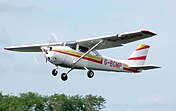
Selected article 29
Portal:Aviation/Selected article/29
A helicopter is a type of rotorcraft in which lift and thrust are supplied by one or more engine driven rotors. In contrast with fixed-wing aircraft, this allows the helicopter to take off and land vertically, to hover, and to fly forwards, backwards and laterally. These attributes allow helicopters to be used in congested or isolated areas where fixed-wing aircraft would not be able to take off or land. The capability to efficiently hover for extended periods of time allows a helicopter to accomplish tasks that fixed-wing aircraft and other forms of vertical takeoff and landing aircraft cannot perform.The word 'helicopter' is adapted from the French hélicoptère, coined by Gustave de Ponton d'Amecourt in 1861, which originates from the Greek helix/helik- (ἕλικ-) = 'spiral' or 'turning' and pteron (πτερόν) = 'wing'.
Helicopters were developed and built during the first half-century of flight, with some reaching limited production, but it was not until 1942 that a helicopter designed by Igor Sikorsky reached full-scale production, with 131 aircraft built. Though most earlier designs used more than one main rotor, it was the single main rotor with antitorque tail rotor configuration of this design that would come to be recognized worldwide as the helicopter. (Full article...)
Selected article 30
Portal:Aviation/Selected article/30 The Airbus A300 is a wide-body airliner developed and manufactured by Airbus. In September 1967, aircraft manufacturers in the United Kingdom, France, and West Germany signed a memorandum of understanding to develop a large airliner. Germany and France reached an agreement on 29 May 1969 after the British withdrew from the project on 10 April 1969. European collaborative aerospace manufacturer Airbus Industrie was formally created on 18 December 1970 to develop and produce it. The prototype first flew on 28 October 1972.
The first twin-engine widebody airliner, the A300 typically seats 247 passengers in two classes over a range of 5,375 to 7,500 km (2,900 to 4,050 nmi). Initial variants are powered by CF6-50 or JT9D turbofans and have a three-crew flight deck. The improved A300-600 has a two-crew cockpit and updated GE CF6-80 or PW4000 engines; it made its first flight on 8 July 1983 and entered service later that year. The A300 is the basis of the smaller A310 (first flown in 1982) and was adapted in a freighter version. Its cross section was retained for the larger A340 (1991) and A330 (1992). It is also the basis for the oversize Beluga transport (1994).
Launch customer Air France introduced the type on 23 May 1974. After limited demand initially, sales took off as the type was proven in early service, beginning three decades of steady orders. It has a similar capacity to the Boeing 767-300, introduced in 1986, but lacked the 767-300ER range. During the 1990s, the A300 became popular with cargo aircraft operators, as passenger airliner conversions or as original builds. Production ceased in July 2007 after 561 deliveries (Full article...)





